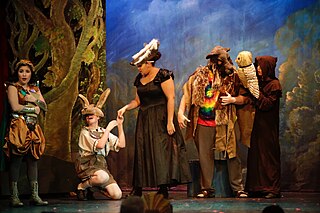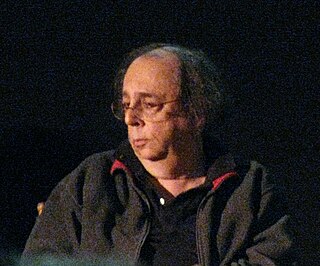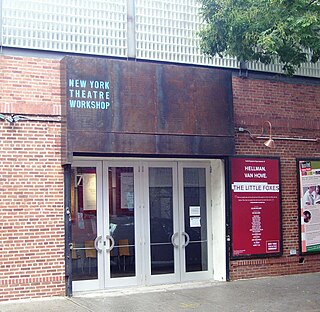
Community theatre refers to any theatrical performance made in relation to particular communities—its usage includes theatre made by, with, and for a community. It may refer to a production that is made entirely by a community with no outside help, or a collaboration between community members and professional theatre artists, or a performance made entirely by professionals that is addressed to a particular community. Community theatres range in size from small groups led by single individuals that perform in borrowed spaces to large permanent companies with well-equipped facilities of their own. Many community theatres are successful, non-profit businesses with a large active membership and, often, a full-time staff. Community theatre is often devised and may draw on popular theatrical forms, such as carnival, circus, and parades, as well as performance modes from commercial theatre. This type of theatre is ever-changing and evolving due to the influences of the community; the artistic process can often be heavily affected by the community's socioeconomic circumstances.
The Open Theater was an experimental theatre group in New York City, active from 1963 to 1973.

Richard Foreman is an American avant-garde playwright and the founder of the Ontological-Hysteric Theater.

New York Theatre Workshop (NYTW) is an Off-Broadway theater noted for its productions of new works. Located at 79 East 4th Street between Second Avenue and Bowery in the East Village neighborhood of Manhattan, New York City, it houses a 198-seat theater for its mainstage productions, and a 75-seat black box theatre for staged readings and developing work in the building next door, at 83 East 4th Street.

Carl Hancock Rux is an American writer and multidisciplinary artist, historian and social activist. The author of a collection of poetry, Pagan Operetta, a novel, Asphalt and the play Talk. Rux has been published as a contributing writer in numerous journals, catalogs, anthologies, and magazines including Interview magazine, Essence magazine, the New York Times, the Los Angeles Times, Iké Udé's aRude Magazine, Nka: Journal of Contemporary African Art and American Theatre (magazine), among others. Rux's writings and monographs on visual art include essays on the work of conceptual artist Glenn Ligon ; the introduction for Nick Cave’s Until; and the Guggenheim Museum’s Carrie Mae Weems retrospective.

Ping Chong is an American contemporary theater director, choreographer, video and installation artist. Born in Toronto and raised in the Chinatown section of Manhattan, Chong is a creator of and an early pioneer in interdisciplinary theater work and the integration of media into it. Chong is considered a seminal figure in Asian American theater and the Asian American arts movement.
Dixon Place is a theater organization in New York City dedicated to the development of works-in-progress from a broad range of performers and artists. It exists to serve the creative needs of artists—emerging, mid-career and established—who are creating new work in theater, dance, music, literature, puppetry, performance, variety and visual arts.
The Margolis Brown Adaptors Company (MBAC) is an internationally touring physical theatre company that also houses the Margolis Method Training Center now located in Highland, New York. It was established in New York City in 1984 by Kari Margolis and Tony Brown. As co-artistic directors, Margolis and Brown have thus far co-authored, directed, and sometimes performed in 16 full-length theatrical productions, as well as numerous site-specific works at such places as the Brooklyn Museum, Coney Island, and the historic John A. Roebling Suspension Bridge on the Delaware River.
Asian American theatre is theatre written, directed or acted by Asian Americans. From initial efforts by four theatre companies in the 1960s, Asian-American theatre has grown to around forty groups today. Early productions often had Asian themes or settings; "yellowface" was a common medium for displaying the perceived exoticism of the East in American performance. With the growing establishment of second-generation Asian-Americans in the 21st century, it is becoming more common today to see Asian-Americans in roles that defy historical stereotypes in the United States.

The American Opera Project (AOP) is a professional opera company based in Brooklyn, New York City, and is a member of Opera America, the Fort Greene Association, the Downtown Brooklyn Arts Alliance, and the Alliance of Resident Theatres/New York (A.R.T./NY). The company's primary mission is to develop and present new operatic and music theatre works and has gained a reputation for the "rarefied range" of the projects it fosters. AOP was founded in 1988 by Grethe Barrett Holby who served as Artistic Director of AOP from 1988 until 2001, at which point Charles Jarden became the company's Executive Director and Steven Osgood the company's Artistic Director. Steven Osgood left the post of Artistic Director in 2008 to pursue conducting full-time but remains the Artistic Director for AOP's "Composers & the Voice" program.

Ruth Sophia Reinprecht, professionally known as Ruth Maleczech, was an American avant-garde stage actress. She won three Obie Awards for Best Actress in her career, for Hajj (1983), Through the Leaves, (1984) and Lear (1990) and an Obie Award for Design, shared with Julie Archer, for Vanishing Pictures (1980), which she also directed. Her portrayal of King Lear as an imperious Southern matriarch in Lear was widely acclaimed.

St. Ann's Warehouse is a performing arts institution in Brooklyn, New York City. It began when the St. Ann's and the Holy Trinity Church on Montague Street was converted into a venue for classical music in 1980. Initially known as Arts at St. Ann's, proceeds from the stage's performances were used to aid in renovating the building.
En Garde Arts is a New York City-based theatre company, and a pioneer in the field of site-specific theatre. They are an artist-centric company that supports playwrights, directors, composers and designers in creating new work from the ground up. “They invite artists to think deeply about the stories they choose to tell and the physical sites where they belong to meet audiences where they live and work, spark conversations that explore a range of perspectives, and build an inclusive community”. Founded in 1985 by Artistic Director Anne Hamburger, the company was New York’s first exclusively site-specific theatre, leading audiences to unexpected locations across the city for innovative, contemporary, highly visual new work. En Garde’s productions earned six Obie Awards, two Drama Desk Awards, the Special Outer Critics Circle Award and the Edwin Booth Award.
The Civilians is an investigative theatre company in New York City founded in 2002 by Artistic Director, Steve Cosson. The Civilians artists pursue their inquiries using interviews, community residencies, research, and other methods. Working with a combination of journalism and art, the Civilians creates theatrical events that seek to promote inquisitions of current issues. According to Variety Magazine, The Civilians "travels far and wide researching a piece around a given subject, conducting interviews and comparing notes along the way, sometimes for years."
Universes is a New York-based American ensemble company of multi-disciplined writers and performers who fuse poetry, theater, jazz, hip hop, politics, down home blues and Spanish boleros to create what has been described as moving, challenging and entertaining theatrical works. The group, with four core members, breaks traditional theatrical bounds to create its own brand of theater.

The Mark Morris Dance Center is the permanent home of the international touring modern dance company, the Mark Morris Dance Group (MMDG), in the Fort Greene neighborhood of Brooklyn, New York City. It is located at the address 3 Lafayette Avenue on the corner of Flatbush Avenue. Open since 2001, the center also houses rehearsal space for the dance community, outreach programs for local children and area residents, and a school offering dance classes to students of all ages.

Indira Etwaroo is a producer, director, scholar and arts and culture executive. Her focus has been on creating and building multi platform spaces and teams, as well as original content that represent the diversity of the globe and lead towards institutional thrivability and equity, while lifting up the voices of underrepresented communities.
Caden Manson is the co-founder and director of Big Art Group, a performance ensemble based in New York City. Dedicated to advancing the boundaries of contemporary performance, Manson has expanded the field through their use of digital media, creative interdisciplinary collaborations, and teaching. Manson is the Editor in Chief and co-curator at Contemporary Performance Network, a community organizing platform and social network dedicated to facilitating collaboration among artists, presenters, scholars and festivals. They are the co-Artistic director of the Special Effects festival, an experimental performance festival which premiered in January 2014. They were the Head of the John Wells Directing Program at Carnegie Mellon University from 2014-2019 and is currently the Director of the Undergraduate and Graduate Theatre Program at Sarah Lawrence College in New York.
Mia Barron is an American actress. She won the Lucille Lortel Award for her performance in the Lincoln Center production of The Coast Starlight, an Obie award for her performance in Hurricane Diane at New York Theatre Workshop, as well as a second Obie and a Drama Desk Award for her work in the ensemble of the Off Broadway production of The Wolves. She co-created, along with director Lars Jan, a theatrical adaptation of Joan Didion's The White Album, which premiered in New York to sold out houses at BAM's Harvey Theatre as part of the Next Wave Festival. She is known for her extensive New York City theater credits, alongside her television and independent film work, most recently Half Empty Half Full, which received a New York Film Award nomination for Best Ensemble. She is also known as the voice of Molotov and Sally Impossible on the Cartoon Network's long-running comic science-fiction series, The Venture Bros.

Johan Petri is a Swedish theatre director, dramatist, and theatre scholar. His work takes place in a field formed by authors of late modernism, contemporary poetry, postdramatic theatre, improvised and contemporary classical music.










